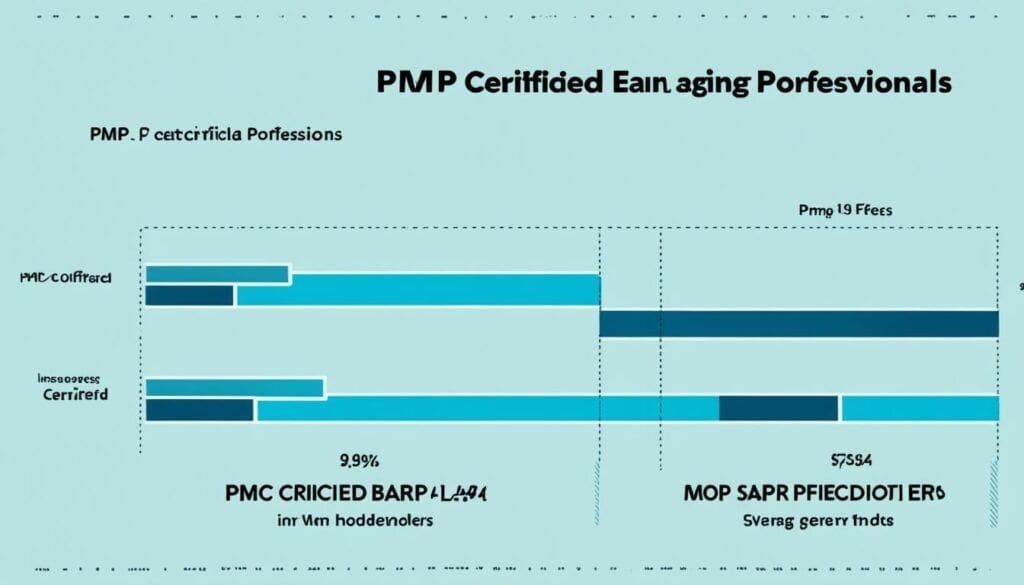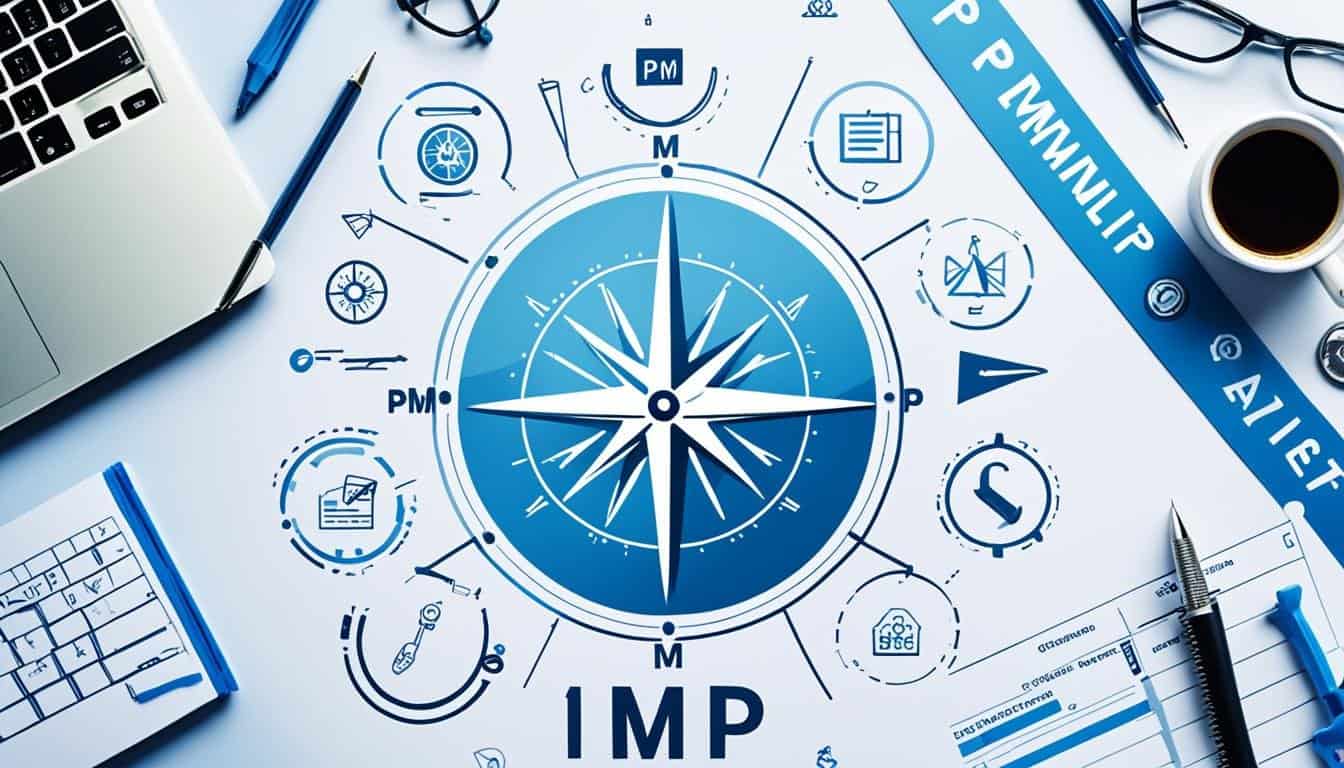Project Management Professional (PMP)
Did you know that professionals with a Project Management Professional (PMP) certification earn on average 25% more than their non-certified counterparts? The PMP certification, administered by the Project Management Institute (PMI), is a globally recognized qualification that sets project managers apart in the competitive job market. By demonstrating expertise in project management, PMP-certified professionals open doors to higher salaries, career advancement, and global opportunities.
Key Takeaways:
- Earning a PMP certification can lead to a 25% higher salary compared to non-certified professionals.
- The PMP certification is globally recognized and valued by employers in various industries.
- PMP-certified professionals have greater career advancement opportunities in project management.
- The certification demonstrates expertise in managing projects and the various aspects of project management.
- PMP-certified professionals have access to a network of project management professionals worldwide.
What is the PMP Certification?
The PMP certification is a globally recognized project management certification administered by the Project Management Institute (PMI). It is a testament to a candidate’s proficiency in managing the people, processes, and business priorities of professional projects. The certification holds weight and recognition in various industries such as healthcare, construction, information technology, and business. With its emphasis on project management expertise, the PMP certification opens doors for project managers to excel in their careers.
Project managers play a crucial role in organizations, ensuring the successful execution of projects within budget and timeline constraints. The PMP certification validates the skills and knowledge required to excel in this dynamic field. Recognized by companies worldwide, the certification enhances a professional’s credentials and demonstrates their commitment to excellence in project management.
By earning the PMP certification, project managers gain a competitive edge in the job market. It increases their chances of being hired for challenging and rewarding positions that demand strong project management skills. Employers prioritize candidates with the PMP certification, as it reassures them of the individual’s ability to handle complex projects and deliver results.
The PMP certification equips project managers with a comprehensive understanding of globally recognized project management principles and best practices. It covers various aspects, including project initiation, planning, execution, monitoring and controlling, and project closure.
Additionally, project managers acquire valuable skills in leadership, communication, risk management, stakeholder management, and team collaboration. These skills are crucial for effectively managing projects and guiding multifunctional teams to achieve project objectives.
“The PMP certification is a testament to a project manager’s ability and dedication to the profession. It provides a solid foundation in project management principles and equips individuals with the necessary skills to excel in their roles.”
Moreover, as projects become increasingly complex and organizations prioritize project management as a core competency, the demand for PMP-certified professionals continues to grow. The certification offers project managers a competitive advantage, enabling them to stand out amidst a highly skilled workforce.
In conclusion, the PMP certification is globally recognized as a symbol of project management excellence. Project managers who hold this certification not only contribute to the success of their organizations but also elevate their careers to new heights. Through the PMP certification, project managers demonstrate their commitment to continuous learning, professional growth, and delivering exceptional results in managing projects.
PMP Certification Requirements
Before aspiring project managers can take the PMP certification exam, they need to fulfill specific requirements. These requirements encompass project management training and project management experience, with variations depending on the candidate’s educational background.
Project Management Training
Candidates are required to complete 35 hours of project management training. This training can be obtained through various channels, including classroom-based courses, online courses, or self-paced learning. One popular option for meeting this requirement is to earn the Certified Associate in Project Management (CAPM) certification, which provides the necessary project management training as a part of the certification process.
By completing either the 35 hours of project management training or earning the CAPM certification, candidates demonstrate their knowledge and understanding of project management principles and practices, preparing them for the PMP exam.
Project Management Experience
In addition to project management training, candidates must have a certain amount of project management experience. The required experience is determined by the candidate’s educational background.
- Candidates with a four-year degree must have a minimum of 36 months (3 years) of project management experience, comprising at least 4,500 hours of leading and directing projects.
- Candidates with a high-school diploma or associate degree need a minimum of 60 months (5 years) of project management experience, with at least 7,500 hours leading and directing projects.
The project management experience requirement ensures that candidates have practical experience in managing projects before pursuing the PMP certification. It allows candidates to apply their knowledge gained through training to real-world scenarios, enhancing their ability to handle project management challenges effectively.
Meeting these PMP certification requirements ensures that candidates have a solid foundation of project management knowledge and experience, positioning them for success in the PMP certification journey.
PMP Exam Cost
One important consideration for aspiring project management professionals is the cost of the PMP exam. The exam fee varies depending on whether the candidate is a member of the Project Management Institute (PMI) or not. The cost of the PMP exam is $555 for non-PMI members and $405 for PMI members.
However, becoming a PMI member can provide significant benefits not only in terms of exam cost savings but also in terms of access to valuable resources and networking opportunities within the project management profession. PMI membership costs $129 per year, along with a one-time application fee of $10.
By joining PMI, candidates can save $150 on the PMP exam fee as well as gain access to a wide range of resources, including research, publications, webinars, and networking events. PMI membership also provides opportunities for professional development and career growth through participation in local chapters and special interest groups.
By becoming a PMI member, aspiring project managers can enjoy not only cost savings on their PMP exam but also a wealth of resources and networking opportunities that can enhance their professional journey.
Training for the PMP Exam
Preparation is key to success in the PMP exam. To ace the test, aspiring candidates must invest time in studying and becoming familiar with the exam content and format. Experts recommend dedicating several months to comprehensive preparation.
There are various resources available to assist candidates in their PMP exam preparations. Exam guides are valuable tools that provide comprehensive coverage of the exam topics, helping candidates understand the key concepts and requirements. These guides offer tips and techniques for effective study, along with sample questions and practice exams.
For those who prefer a structured approach, PMP exam preparation courses are highly beneficial. These courses are specifically designed to equip candidates with the knowledge and skills necessary to pass the exam. PMI-approved courses are widely recognized and cover the exam content in detail, ensuring a comprehensive understanding of project management principles and best practices.
In addition to courses and guides, there are numerous books and study materials available to enhance PMP exam preparation. These resources provide additional insights, real-world examples, and practice questions to further strengthen candidates’ knowledge and readiness.
To reinforce understanding and test knowledge, candidates can engage in self-study and utilize online resources. Online forums, discussion boards, and study groups allow candidates to connect with fellow aspirants, exchange ideas, and seek clarification on exam-related queries.
Remember, the PMP exam is challenging, and thorough preparation is essential for success. Utilize exam guides, courses, books, and online resources to maximize your chances of passing the exam with flying colors.
Benefits of proper PMP exam preparation:
- Enhanced understanding of project management principles
- Improved performance in the exam
- Increased confidence during the exam
- Opportunity to practice and refine test-taking strategies
- Better retention of information
Renewing your PMP Certification
Once you have earned your PMP certification, it’s important to keep it up to date by renewing it. The PMP certification is valid for three years, and renewal requires earning 60 professional development units (PDUs). PDUs are a measure of your professional development and can be earned through various activities related to project management.
To maintain your PMP certification, you can participate in accepted professional development activities such as:
- Attending courses or training programs
- Participating in seminars or conferences
- Engaging in self-directed learning
By actively investing in your professional growth, you not only renew your certification but also stay updated with the latest advancements in the field of project management. It allows you to enhance your knowledge, skills, and expertise, ensuring you remain a valuable asset in the industry.
Staying up to date with ongoing professional development also helps you excel in your project management career and opens up new opportunities for growth and advancement. By earning the required PDUs, you demonstrate your commitment to continuous learning and dedication to excellence in project management.
Remember to keep track of your professional development activities and the PDUs you earn. PMI provides a straightforward process for reporting and documenting your PDUs. By fulfilling the renewal requirements, you can maintain your PMP certification and continue to reap the benefits it offers.
PDUs Earned through Different Activities
Here is a breakdown of the PDUs you can earn through various professional development activities:
| Activity | PDU Category | PDU Value |
|---|---|---|
| Formal Education | Course or Training | 1 PDU per hour |
| Online or Digital Media | Self-Directed Learning | 1 PDU per hour |
| Organizational Meetings | Continuing Education | 1 PDU per hour |
| Volunteer Service | Giving Back to the Profession | 1 PDU per hour |
| Working as a Professional | Learning from Work Experience | 1 PDU per hour |
By engaging in a variety of activities, you can accumulate the required 60 PDUs over the course of your certification cycle. It’s important to choose activities that align with your professional goals and interests, as well as contribute to your growth as a project manager.
Remember, maintaining your PMP certification not only demonstrates your dedication to the project management profession but also keeps you updated with the latest industry trends and best practices. It ensures that you continue to excel in your career and deliver successful projects.
How to Get Your PMP Certification
Obtaining the PMP certification involves a step-by-step process that includes meeting eligibility requirements, submitting an application, and successfully completing the PMP exam.
Step 1: Check Eligibility
Before applying for the PMP certification, candidates must ensure they meet the eligibility requirements set by the Project Management Institute (PMI). These requirements typically include:
- Minimum project management experience (varies depending on educational background)
- Educational qualifications (high-school diploma, associate degree, or four-year degree)
Validating eligibility is crucial as it determines whether candidates can proceed with the application process.
Step 2: Submit the Application
Once eligibility is confirmed, candidates can proceed with submitting their application to PMI. The application serves as proof of their project management experience and educational background. It is essential to provide detailed and accurate information to expedite the review process. PMI reviews each application carefully to ensure candidates meet the certification requirements.
Step 3: Schedule and Take the PMP Exam
After receiving approval for the application, candidates can schedule their PMP exam. The PMP exam assesses a candidate’s project management knowledge, application skills, and situational judgment. It consists of 180 questions and has a time limit of 230 minutes. Candidates must thoroughly prepare for the exam by studying relevant resources and practicing sample questions.
Step 4: Earn Your PMP Certification
Successful completion of the PMP exam results in earning the prestigious PMP certification. It signifies that candidates possess the necessary knowledge and skills to manage projects effectively. PMP-certified professionals are highly sought after in the field of project management and enjoy numerous career opportunities.
| Steps | Description |
|---|---|
| Step 1 | Check Eligibility |
| Step 2 | Submit the Application |
| Step 3 | Schedule and Take the PMP Exam |
| Step 4 | Earn Your PMP Certification |
Is the PMP Worth it?
The value of the PMP certification depends on individual circumstances. However, there are several benefits associated with earning the certification. These include:
- Industry Recognition: The PMP certification is globally recognized and highly valued in the project management profession. It demonstrates expertise and proficiency in managing projects, making certified professionals stand out among their peers.
- Learning New Skills: Pursuing the PMP certification offers an opportunity to acquire new knowledge and skills in project management. The certification process covers a wide range of topics, including project planning, execution, monitoring, and closure, allowing professionals to enhance their capabilities in managing complex projects.
- Higher Salaries: PMP-certified professionals tend to earn higher salaries compared to their non-certified counterparts. According to the Project Management Salary Survey conducted by PMI, PMP certification holders earn, on average, 25% higher salaries than those without the certification.
- Job Prospects: Having a PMP certification opens up better job prospects in the project management field. Many organizations prioritize hiring PMP-certified professionals due to their demonstrated skills and knowledge in project management. This certification can enhance career opportunities and increase the chances of securing senior-level positions or leadership roles.
In conclusion, earning the PMP certification offers numerous benefits, including industry recognition, the opportunity to learn new skills, higher earning potential, and improved job prospects. It can be a valuable investment in one’s professional growth and advancement in the field of project management.

| Benefits of PMP Certification | |
|---|---|
| 1. | Industry Recognition |
| 2. | Learning New Skills |
| 3. | Higher Salaries |
| 4. | Job Prospects |
What’s on the PMP Exam?
The Project Management Professional (PMP) exam is a comprehensive assessment that evaluates a candidate’s knowledge and skills in project management. It covers a wide range of topics to ensure that certified professionals are equipped to handle various project management scenarios and challenges.
Exam Format
The PMP exam consists of 180 questions, and candidates have a total of 230 minutes to complete it. The questions are presented in different formats to assess different skills and abilities. These formats include:
- Multiple-choice questions: These questions provide a list of options, and candidates must select the correct answer.
- Multiple response questions: Candidates must select multiple correct answers from a list of options.
- Matching questions: Candidates must match items from two columns to create meaningful pairs.
- Hotspot questions: Candidates must identify specific areas or points of interest on a given image or diagram.
- Limited fill-in-the-blank questions: Candidates must fill in the missing words or phrases in a sentence or paragraph.
Domains of the Exam
The questions on the PMP exam are categorized into three domains, each representing a different aspect of project management:
- People: This domain focuses on the management of individuals and teams involved in a project, including communication, stakeholder engagement, and team dynamics.
- Process: The process domain covers the various project management processes, such as initiating, planning, executing, monitoring and controlling, and closing a project.
- Business: This domain explores the business aspects of project management, including project governance, risk management, and procurement.
The questions in the PMP exam are distributed across these domains to ensure a well-rounded evaluation of a candidate’s project management knowledge and skills.
Project Management Approaches
The PMP exam content includes questions related to both predictive project management approaches and Agile or hybrid approaches. Roughly half of the exam content focuses on predictive project management, which follows a well-defined plan and sequential execution. The other half covers Agile or hybrid approaches, which prioritize flexibility, adaptability, and iterative delivery.
Example Question Distribution by Domain
| Domain | Percentage of Questions |
|---|---|
| People | 42% |
| Process | 50% |
| Business | 8% |
The distribution of questions by domain ensures that candidates demonstrate their understanding and proficiency in all areas of project management.
Training for the PMP Exam: Courses and Resources
Preparing for the PMP exam requires comprehensive training and access to reliable study materials. Luckily, there are several options available to aspiring PMP professionals. Let’s explore the various courses and resources that can help you succeed in your PMP exam preparation.
PMI Exam Prep Courses
The Project Management Institute (PMI) offers a range of exam prep courses to help candidates acquire the knowledge and skills necessary to excel in the PMP exam. These courses are available both online and in-person, providing flexibility to suit different learning preferences and schedules. By enrolling in PMI-approved exam prep courses, you can access expert guidance and gain a solid understanding of the exam content.
Online Exam Prep Courses
In addition to PMI’s offerings, various online platforms and institutions provide PMP exam prep courses that cover the exam content in detail. These courses are designed for individuals seeking flexibility in their study approach. Online courses often feature interactive modules, practice exams, and multimedia resources to enhance learning and retention. Some popular online platforms for PMP exam prep include Udemy, Simplilearn, and LinkedIn Learning.
Study Materials
Studying with the right materials is crucial for PMP exam success. To supplement your course or self-study efforts, you can access a variety of study materials. These may include comprehensive study guides, textbooks, and reference materials focused on the PMBOK Guide, which is an essential resource for project management knowledge. These materials provide detailed explanations, examples, and practice questions to familiarize you with the exam format and content.
Practice Exams
Practice exams are invaluable tools for assessing your knowledge and readiness for the PMP exam. They simulate the actual exam experience, allowing you to become familiar with the types of questions and time constraints involved. Many exam prep courses and online platforms offer practice exams with detailed answer explanations. By taking multiple practice exams, you can identify areas that require further study and improve your overall test-taking skills.
PMBOK Guide
The Project Management Body of Knowledge (PMBOK) Guide is a comprehensive resource that serves as the foundation for the PMP exam. It outlines project management best practices, processes, and concepts that the exam tests. Familiarizing yourself with the PMBOK Guide will not only help you succeed in the exam but also provide a solid framework for effective project management. Make sure to thoroughly study and understand the content of the guide to ensure success on exam day.
Summary
To excel in the PMP exam, it is essential to engage in thorough training and leverage the available resources. PMI’s exam prep courses, online platforms, study materials, practice exams, and the PMBOK Guide are valuable assets that can help you prepare and pass the PMP exam with confidence. Take advantage of these resources to enhance your understanding of project management concepts, improve your test-taking skills, and increase your chances of success in obtaining the prestigious PMP certification.
| Training Options | Features |
|---|---|
| PMI Exam Prep Courses | Expert guidance and comprehensive content |
| Online Exam Prep Courses | Flexible learning with interactive modules and practice exams |
| Study Materials | Comprehensive guides, textbooks, and PMBOK Guide reference materials |
| Practice Exams | Simulated exams for test-readiness assessment |
| PMBOK Guide | Essential resource for project management knowledge |
With the right training and resources at your disposal, you can confidently prepare for the PMP exam and take significant strides towards achieving your professional goals in project management.
Other Project Management Certifications
In addition to the PMP certification, there are several other project management certifications available that can contribute to career development and enhance specific skills in the field.
- Certified Associate in Project Management (CAPM) Certification: The CAPM certification offers a valuable alternative for individuals who are starting their project management careers or do not yet meet the requirements for the PMP certification. It provides foundational knowledge in project management and validates an individual’s understanding of project management terminology and processes. The CAPM certification can serve as a stepping stone towards earning the PMP certification in the future.
- PRINCE2 Certification: The PRINCE2 (Projects IN Controlled Environments) certification is widely recognized in the United Kingdom and Europe. It focuses on a structured project management methodology that provides a framework for effectively managing projects of any size or complexity. PRINCE2 emphasizes scalability and tailoring, making it applicable to a wide range of industries and project types.
- Agile Certifications: Agile project management has gained popularity in recent years, and there are several certifications available that focus on Agile methodologies. These certifications, such as the Certified ScrumMaster (CSM) or Agile Certified Practitioner (PMI-ACP), validate an individual’s knowledge and expertise in Agile project management approaches. They are particularly valuable for professionals working in fast-paced, iterative project environments.
By earning these alternative certifications, project management professionals can expand their skillsets, demonstrate competency in specific methodologies, and increase their career opportunities within their respective industries.
Conclusion
The Project Management Professional (PMP) certification is a valuable asset for individuals seeking career advancement and professional growth in the project management profession. By obtaining the PMP certification, professionals can demonstrate their expertise in managing projects and stand out in a competitive job market.
With the PMP certification, individuals can unlock new opportunities for career advancement. Employers highly value the PMP certification as it signifies a commitment to excellence in project management and the ability to deliver successful projects. PMP-certified professionals are often considered for leadership roles and more complex projects, leading to greater career prospects.
Furthermore, the PMP certification opens doors to higher earning potential. PMP-certified professionals tend to earn higher salaries compared to their non-certified counterparts. This certification is a testament to the candidate’s knowledge, skills, and experience, making them eligible for more rewarding positions and compensation packages.
In conclusion, the PMP certification is a critical milestone for professionals in the project management profession. It provides tangible benefits such as career advancement, professional growth, and higher earning potential. By meeting the certification requirements and successfully passing the exam, individuals can position themselves for success in the dynamic field of project management.
FAQ
What is the PMP Certification?
The PMP certification is a globally recognized project management certification administered by the Project Management Institute (PMI). It tests a candidate’s ability to manage the people, processes, and business priorities of a professional project. It is applicable to project managers in virtually any industry, including healthcare, construction, information technology, and business. The certification is highly valued by employers and can enhance career opportunities in the field of project management.
What are the requirements for the PMP Certification?
To be eligible for the PMP certification exam, candidates must complete 35 hours of project management training or hold a Certified Associate in Project Management (CAPM) certification. Additionally, candidates must have a certain amount of project management experience, depending on their level of education. A four-year degree requires 36 months of experience, while a high-school diploma or associate degree requires 60 months of experience.
How much does the PMP exam cost?
The cost of the PMP exam is $555 for non-PMI members and $405 for PMI members. Becoming a PMI member costs $129 per year, with a one-time $10 application fee. By joining PMI, candidates can save on the exam fee and gain access to various resources and networking opportunities in the project management profession.
How should I prepare for the PMP exam?
Preparation for the PMP exam requires studying and familiarizing oneself with the exam content and format. Recommended exam guides suggest dedicating several months to preparation. There are various courses, books, and resources available to assist candidates in their study efforts. These resources provide comprehensive coverage of the exam topics and help candidates prepare effectively for the PMP certification.
How can I renew my PMP Certification?
The PMP certification is valid for three years and can be renewed by earning 60 professional development units (PDUs). PDUs can be earned through participation in accepted professional development activities, such as courses, seminars, conferences, and self-directed learning. Maintaining the certification requires a commitment to ongoing professional development and staying up to date with the latest developments in the field of project management.
How do I get my PMP Certification?
To obtain the PMP certification, candidates must meet the eligibility requirements, which include project management experience and educational qualifications. Next, candidates need to submit an application to PMI for review and approval. Once the application is approved, candidates can schedule and take the PMP exam. Successful completion of the exam results in earning the PMP certification.
Is the PMP Certification worth it?
The value of the PMP certification depends on individual circumstances. However, there are several benefits associated with earning the certification. These include industry recognition, as the PMP certification demonstrates expertise in project management. It also provides an opportunity to learn new skills and advance one’s career. Additionally, PMP-certified professionals tend to earn higher salaries and have better job prospects in the project management field.
What is covered on the PMP Exam?
The PMP exam consists of 180 questions, with a time limit of 230 minutes. The exam includes a combination of multiple-choice, multiple responses, matching, hotspot, and limited fill-in-the-blank questions. The questions fall into three domains: People, Process, and Business. Roughly half of the content represents predictive project management approaches, while the other half represents Agile or hybrid approaches.
What options are available for training and preparation for the PMP Exam?
There are various options for training and preparation for the PMP exam. PMI offers exam prep courses, both online and in-person, to provide candidates with the necessary knowledge and skills. Other online platforms and institutions also offer PMP exam prep courses that cover the exam content in detail. In addition to courses, candidates can access study materials, practice exams, and the PMBOK Guide, which is a comprehensive resource for project management knowledge.
Are there other project management certifications besides the PMP?
Yes, besides the PMP certification, there are other project management certifications available. The Certified Associate in Project Management (CAPM) certification is a valuable alternative for individuals who are starting their project management careers or do not yet meet the requirements for the PMP certification. Other certifications, such as PRINCE2 and Agile certifications, focus on specific project management methodologies and approaches. These certifications can be beneficial for career development and enhancing specific skills in project management.







